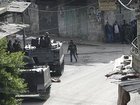Sporadic sniper gunshots returned to Tripoli on Wednesday evening and tensions surged after gunmen shot and wounded four Jabal Mohsen residents in the city despite an army security plan that had managed to end seven days of clashes on Monday.
“Mohammed Abdul Razzaq Abdullah, Nasser Mahfouz and Bilal Ali Mohsen were shot and wounded in the legs at the al-Mallouleh roundabout as they were returning from their workplaces,” state-run National News Agency said. LBCI television said the three were on their way back from Beirut.
 Full Story
Full Story
The United States expressed on Wednesday its “deep” concern over the “worsening” security situation in Lebanon, including the northern city of Tripoli, it said via the U.S. Embassy in Lebanon.
It tweeted that it call for all sides in Lebanon to exercise restraint.
 Full Story
Full Story
The Maronite Bishops Council lamented on Wednesday the ongoing political deadlock in Lebanon given the failure to form a new government and convene parliament and given the unrest in the northern city of Tripoli.
It said: “Parliament and Tripoli have become arenas for rival political parties to settle their scores.”
 Full Story
Full Story
President Michel Suleiman, caretaker Prime Minister Najib Miqati, and Army Commander General Jean Qahwaji discussed on Tuesday the implementation of the security plan in Tripoli aimed at containing the tensions in the northern city.
They stressed the need to “completely implement the security plan.”
 Full Story
Full Story
Al-Mustaqbal bloc stated on Tuesday that Hizbullah chief's latest televised speech is a part of a “psychological war,” stressing also on their rejection of all armed presence in the northern city of Tripoli.
"Sayyed Hassan Nasrallah's speech is arrogant and is a part of a psychological war he is wahing,” the bloc said in a released statement after the MPs' weekly meeting at the Center House.
 Full Story
Full Story
U.N. Special Coordinator for Lebanon Derek Plumbly on Tuesday hailed the efforts exerted to contain the violence in the northern city of Tripoli and denied knowledge of reported plans to destroy Syria's chemical weapons in Lebanon.
Following talks with Caretaker Prime Minister Najib Miqati at the Grand Serail, Plumbly expressed his “deep concern over the recurrence of violence in Tripoli and welcomed the efforts of the army and security forces, in parallel with political efforts and the efforts of the caretaker Prime Minister, to restore calm across the city.”
 Full Story
Full Story
Former Prime Minister Saad Hariri hoped on Tuesday that the residents of Tripoli would cooperate with the army and security forces in their deployment in the northern city as they attempt to restore calm there.
He said in a statement: “The state should not hesitate in providing all elements that will place Tripoli's security under the rule of the law.”
 Full Story
Full Story
The Military Prosecutor referred on Tuesday a suspect to the Internal Security Forces Intelligence Branch to carry out the initial investigation with him on his role in the deadly mosque bombings in the northern city of Tripoli.
Judge Saqr Saqr, who is the state commissioner to the military court, asked the Intelligence Branch to “question Ahmed Mohammed Ali over the information he has on the Tripoli blasts and his role in the case.”
 Full Story
Full Story
Lebanese army units deployed on Tuesday in a street that separates two rival neighborhoods of the northern city of Tripoli that have been engaged in gunbattles for the past week.
The troops began their deployment at 7:00 am in Syria Street which lies between Jabal Mohsen and Bab al-Tabbaneh districts.
 Full Story
Full Story
Progressive Socialist Party leader MP Walid Jumblat on Monday criticized remarks voiced by former premier Saad Hariri and Lebanese Forces chief Samir Geagea over the deadly clashes in Tripoli, stressing that fighting between the rival districts of Bab al-Tabbaneh and Jabal Mohsen cannot “change the course of the bloody developments in Syria.”
“There are some strange self-contradictory stances, as some are urging the cabinet to convene to remove arms from Tripoli while refusing its convention over other matters or the convention of parliament under the excuse that it is a caretaker cabinet! And some are in some way or another holding the Lebanese army responsible for what's happening in Tripoli, while what's needed more than ever is support for the military institution,” Jumblat said in his weekly editorial in al-Anbaa newspaper, referring to Geagea and Hariri.
 Full Story
Full Story



